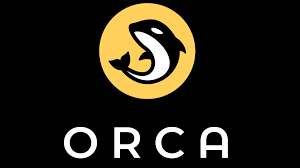What is Orca in Crypto? Diving into Solana's User-Friendly DEX for Efficient Trading
The world of decentralized finance (DeFi) can often feel like a complex ocean, with new protocols and platforms emerging constantly. Among the bustling ecosystem of decentralized exchanges (DEXs), Orca has emerged as a significant player, particularly for those seeking a smooth and efficient trading experience on the Solana blockchain. But what exactly is Orca, and why is it gaining traction in the competitive crypto landscape?
Orca: A Solana DEX Designed for Everyone
At its core, Orca is an exchange cryptocurrency on the Solana blockchain. It operates as a decentralized exchange (DEX) and an Automated Market Maker (AMM). This means that unlike traditional centralized exchanges (CEXs) where you trade against a company, on Orca, you exchange tokens directly with other users via liquidity pools and smart contracts, without the need for an intermediary.
Orca's primary mission is to make DeFi accessible and user-friendly, even for newcomers. While many early DEXs on Ethereum presented a steep learning curve, Orca focuses on an intuitive interface and simplified processes, aiming to be a "DEX for people, not programs."
The Solana Advantage: Speed, Low Fees, and Efficiency
One of Orca's most compelling features stems directly from its foundation on the Solana blockchain. Solana is renowned for its exceptional speed, scalability, and, crucially, minimal transaction fees and lower latency compared to many other popular blockchains, especially Ethereum.
Here's a breakdown of the benefits Orca leverages from Solana:
Minimal Transaction Fees: While Ethereum's gas fees can skyrocket during peak network congestion, making small transactions uneconomical, Solana boasts consistently low fees, often costing fractions of a cent. This makes Orca a highly attractive option for frequent traders and those engaging in smaller volume swaps.
Lower Latency and Near-Instant Finality: Solana's architecture allows it to process thousands of transactions per second (TPS) with near-instant transaction finality (often under a second). This translates to a much smoother trading experience on Orca, with less waiting for transactions to confirm and minimal slippage, even during volatile market conditions. This is a stark contrast to Ethereum, where transaction confirmation times can be significantly longer.
Scalability: Solana's high throughput ensures that Orca can handle a large volume of trades without experiencing network slowdowns or prohibitive costs, providing a reliable platform for decentralized trading.
How Orca Works: Swapping Tokens and Earning Rewards
On Orca, you can exchange a wide variety of SPL tokens (Solana Program Library tokens). The process is straightforward:
Connect Your Wallet: You connect a Solana-compatible wallet (like Phantom or Solflare) to the Orca platform.
Select Tokens: Choose the token pair you wish to swap (e.g., SOL for USDC).
Enter Amount: Specify the amount you want to trade.
Confirm Transaction: Review the transaction details and confirm the swap within your wallet.
Orca also implements features like a Fair Price Indicator, which helps users ensure they are getting a competitive rate and warns them about potential slippage, enhancing transparency and user confidence.
Beyond simple token swaps, Orca offers opportunities for users to earn passive income by participating in its liquidity pools:
Provide Liquidity (LPing): You can contribute a pair of tokens to a trading pool (e.g., SOL/USDC). By doing so, you become a liquidity provider (LP) and help facilitate trades on the platform.
Earn Trading Fees: In return for providing liquidity, you earn a share of the trading fees generated from transactions within that specific pool. This incentivizes users to contribute to the platform's liquidity, ensuring efficient trading for everyone.
Whirlpools (Concentrated Liquidity): Orca's innovative "Whirlpools" are concentrated liquidity pools. This advanced AMM model allows LPs to specify a narrower price range for their provided liquidity, which can lead to higher capital efficiency and potentially increased fee earnings, while also providing better prices and less slippage for traders.
The ORCA Token: Governance and Incentives
Orca has its native governance token, ORCA. Holding ORCA tokens grants you:
Governance Rights: ORCA token holders can participate in the protocol's governance, voting on proposals and shaping the future direction of the Orca DEX, including potential upgrades and changes to fee structures.
Liquidity Provider Incentives: In addition to earning trading fees, LPs can also receive ORCA token rewards, further incentivizing their participation in securing the platform's liquidity.
Keywords:
Decentralized Exchange & Trading:
"Best DEX for Solana"
"Solana token swap"
"Low-fee crypto exchange"
"Decentralized trading platform"
"Crypto trading fees comparison"
"Liquidity providing crypto"
"Yield farming Solana"
"Passive income crypto"
Blockchain & Ecosystem:
"Solana blockchain benefits"
"Ethereum killer projects"
"Web3 dApps Solana"
"Crypto ecosystem investment"
"Blockchain scalability solutions"
Specific Platform & Features:
"Orca crypto review"
"How to use Orca DEX"
"ORCA token price prediction"
"Whirlpools concentrated liquidity"
"Fair Price Indicator crypto"
Security & Wallets:
"Secure Solana wallet"
"Best crypto wallet for DEX trading"
"DeFi security best practices"
Investment & Analysis:
"Crypto investment strategy"
"DeFi project analysis"
"Cryptocurrency market trends"
"Altcoin investment opportunities"
Conclusion: Orca's Role in the Evolving DeFi Landscape
Orca stands as a compelling example of how decentralized exchanges are evolving to become more user-friendly and efficient. By leveraging the inherent advantages of the Solana blockchain – particularly its low transaction fees and high speed – Orca offers a seamless and cost-effective solution for swapping tokens and earning rewards through liquidity provision. As the DeFi space continues to mature, platforms like Orca, with their focus on user experience and robust underlying technology, are poised to play a crucial role in bringing decentralized finance to a broader global audience.

